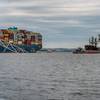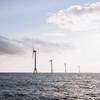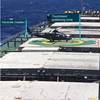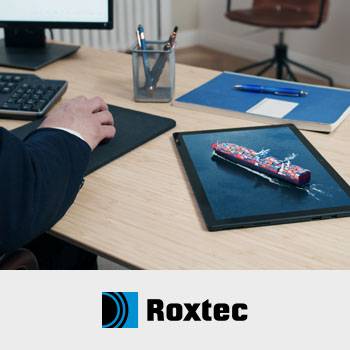To the dismay of some oil companies, as well as oil, freight, and passenger shipping companies, a growing number of environmental prosecutors are seeking - and winning - fines and punishments they insist are high enough to deter pollution from deliberate or even accidental oil pollution. Often, the culprits or their offenses seize headlines: what British Shipping Minister Glenda Jackson calls "naming and shaming."
The U.S. consistently leads the world in such prosecutions, although Canada, Australia, and a growing number of European nations are following suit.
Royal Caribbean Cruise Lines (RCCL), the world's second largest cruise operator, has been the most prominent catch - paying more than $27 million in fines in the U.S. over the past two years. In court, RCCL admitted an elaborate conspiracy to hide evidence that its liners deliberately and illegally dumped oil or toxic chemicals on more than a score of occasions, even as the company touted itself as environmentally friendly.
In public, prosecutors flailed the company for shameless profit mongering. It didn't help that the Miami-based firm had tried to duck prosecution by claiming it was a Norwegian corporation, immune from trial in the U.S. RCCL has company, including competitor Holland America Lines, which paid $2 million in oil spill fines in 1998.
Last year, an oil recycler, James Ming Hong was sentenced to three years in prison and a $1.3 million fine for a sloppy operation that spilled oil into a public sewer near Richmond, Va. Hong, the judge decided, had siphoned capital out of his company, even as he knew the plant needed expensive repairs.
The U.S. EPA collected $68,600 from Speedy's Convenience, a retail chain, not because its tank farm at Lupton, Ariz. had spilled oil, but because EPA said the firm had dragged its feet for nearly a year about complying with the government's Spill Prevention, Control and Countermeasures (SPCC) program. The company wasn't prepared to contain and recover a leak, if one occurred.
RCCL's offenses find little sympathy among oil companies, or in the U.S. oil tanker and barge industries, which have spent millions of dollars for spill prevention and clean-up readiness since the 1989 Exxon Valdez tanker spill.
Hoisting a newspaper detailing the RCCL conspiracy case last January, a leading tanker executive warned colleagues it had unraveled oil carriers' sincere efforts at boosting their environmental image by averting accidents and slashing routine pollution.
"In the mind of the public, 'oil' means 'tanker.' The next time we have a major tanker spill, people aren't going to remember this was a cruise ship. They are going to blame this one on us," he said.
Nonetheless, oil companies and oil carriers insist the threat of prosecution in cases of accidental pollution is now so formidable it may interfere with spill responses and legitimate safety - not criminal - investigations.
The first clear example of this occurred in July, when staff of Olympic Pipe Line Company, citing their right against self-incrimination, refused to talk with the National Transportation Safety Board (NTSB) about a pipeline explosion that killed three bystanders in Bellingham, Wash. The NTSB's duty is to find the root causes of transportation accidents; it cannot lay criminal charges.
The USCG - which conducts both kinds of inquiries and also monitors oil spill cleanups - has conceded the problem and is studying its own methods.
In the meantime, Greek owners of oil tanker, Command, paid $9.4 million in fines, restitution, and damages in December, for a 3,000-gallon bunker fuel spill that killed 170 birds off San Francisco in 1998. Officials conceded the spill was accidental; the Command's captain conceded it resulted from his negligence and he'd violated the law by failing to report it and then denying it had happened when the USCG tracked the ship down.
The case compares with that of Eklof Marine Corp., responsible for the worst oil spill in the history of Rhode Island when its barge grounded in 1996, spilling 828,000 gallons of oil into Block Island Sound. After pleading guilty to negligence, Eklof paid fines and other penalties of $7 million in 1998 -- on top of a $17 million spill response.
Later, President Doug Eklof told a Congressional committee he might not have been so cooperative during the spill response, had he known the government would prosecute his company. Eklof still expects to pay more than $8 million to settle wildlife damages in the case.
Canadian environmental authorities have been looking at the U.S. penalties with envy and pressing magistrates to impose deterrent penalties.
The record so far: U.S. $27,265 against a Bahamian-flagged tanker, Nordholt, caught trailing an 11-km oil slick last March off Nova Scotia. Prosecutor James Martin had sought a $68,162 penalty, arguing it would send a message to ships that routinely discharge waste oil in Canada's North Atlantic shipping lanes rather than pay for disposal in port. Environment Canada says the illegal practice kills thousands of seabirds each year.
As a measure of Martin's success, lawyers for the Nordholt reckoned previous sentences for similar cases in Atlantic Canada justified only a $6,816 fine. Canadian authorities are currently gathering evidence to support changes in the Canadian Shipping Act that would make it easier to win big fines. At present, for example, they cannot charge a ship's officer or crew member with a felony and squeeze him to implicate his superiors, as U.S. prosecutors can do.
With stakes this high, perhaps it is not surprising companies respond aggressively to spills in the U.S. and in Canada. For example:
On November 24, 1999, Chevron Pipe Line Company dispatched more than 175 people to respond to a 35,700-gallon crude oil spill on from a pipeline at Four Bayou Pass, about 13 km north-northeast of Grande Isle, La. Employees of Tennessee Gas Pipeline Company discovered the spill before dawn and had initiated the response after notifying the USCG, Chevron says. Chevron notified all government authorities by 6:20 a.m. and took over as responsible party at 10:20 a.m., the company says.
Most of the oil drifted into the Gulf of Mexico and dispersed, but oil hit several offshore islands, which crews for Chevron promptly cleaned. The company also hired a bird rehabilitation firm, which treated 13 ailing birds in a special Chevron trailer parked near the spill site.
That same morning in Vancouver, B.C., Canada, a passenger ferry captain discovered canola oil floating on the harbor. The Vancouver Harbormaster was first to respond at 7:45 a.m., booming an industrial drain serving a seed-pressing company. The presser, West Coast Reduction, had been fined in 1998 for a canola spill and at 10:56 a.m. it called out Burrard Clean, Vancouver's oil spill recovery company. But by then the tide had turned and began pulling the oil through Vancouver's narrow harbor, reports Martyn Green, Burrard Clean's president.
Rancid oil eventually oiled more than 200 birds, and fouled beaches at two public parks. West Coast Reduction eventually withdrew from the operation. Source of the spill remains under investigation, and Canadian officials vow that once identified, "the polluter will pay."
Jim Polson is editor of the Oil Spill Intelligence Report, a weekly international newsletter on oil spill combating methods, technology and policy. For information about subscriptions, contact Cutter Information Corp., 37 Broadway, Suite 1, Arlington, Mass. 02474-5552; Phone: 781-641-5118; Fax: 781-648-8707; email: [email protected]; Website: www.cutter.com/osir/
Sponsored Content
LR - Fit for 55: Managing compliance and optimising operations
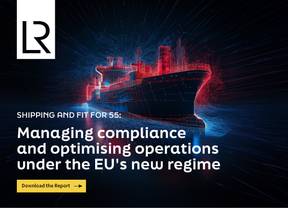
Use Roxtec seals, services and software

Subscribe for
Maritime Reporter E-News
Maritime Reporter E-News is the maritime industry's largest circulation and most authoritative ENews Service, delivered to your Email five times per week



